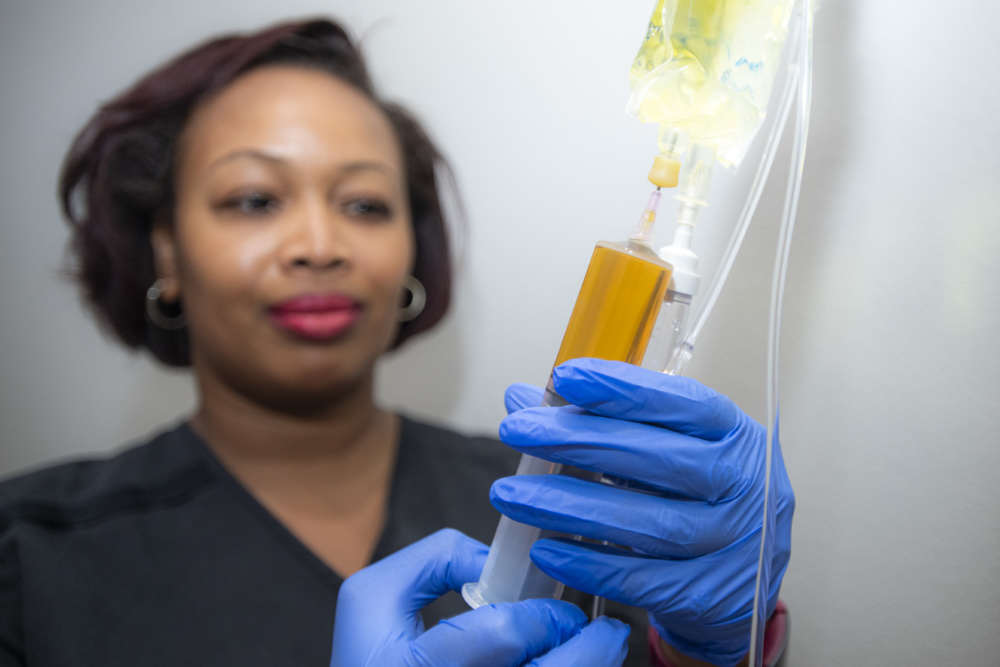Infertility is defined as inability to get pregnant after at least 12 consecutive months of having unprotected sex, in a child-bearing age group. According to the CDC (Center for Disease Control and prevention -2015): The number of women aged 15-44 with impaired fecundity is estimated at 7.5 million or 12.3% in the USA. The numbers of married women aged 15-44 that are infertile are thought to be greater than 1.0 million. That’s a substantial population of people that are in need of help,, and should not be ignored. One of the most common causes of infertility is Polycystic Ovarian Syndrome (PCOS), which accounts for 10% of the causes. PCOS is a condition of unknown etiology characterized by menstrual abnormalities such as irregular menstrual cycles, multiple cysts in the ovary, and/or biochemical features of hyperandrogenism. Hyperandrogenism refers to symptoms related to an increase in androgens, such as testosterone, which can lead to hirsutisim (excessive growth of facial or body hair), male-pattern baldness, or acne. Type 2 diabetes mellitus and obesity are consistently associated with PCOS. More than 50% of patients with a PCOS diagnosis are overweight or obese. In fact, even normal-weight PCOS subjects have increased intra-abdominal fat and have problems with insulin resistance. Weight gain and obesity worsen the features of PCOS, and weight loss improves these features. Obesity has been linked with infertility for years, but substantial evidence has been published since 2005. Apart from infertility, other known conditions that affect child-bearing obese women are pregnancy loss, pregnancy-associated complications (such as preeclampsia and gestational diabetes), and postpartum complications including hemorrhage, as well as higher rates of infant mortality and congenital defects. Obesity in patients with PCOS is also associated with a delayed or failed response to fertility treatments. PCOS is due to a complex interaction between environmental and genetic factors. Insulin resistance and hyperinsulinemia are thought to be key mechanisms. The ovaries in PCOS patients are manifested by functional hyperandrogenism (hormones that express male features) characterized by an elevated serum luteinizing hormone (LH) level. This results in hyperstimulation of cells in the ovary and causes the “polycystic” nature of the ovaries typically seen on ultrasound examinations in PCOS. The increase in LH levels is thought to be the result of relatively high and unchanging concentrations of estrogens that might alter the control of this hormone by a complex brain pathway. The combination of elevated serum levels of insulin, androgens, estrogens, and luteinizing hormone explains the classic manifestation of PCOS. Obesity increases insulin resistance by many pathways, so the severity of PCOS increases with worsening diabetes and obesity.
Treatment for PCOS:
Hormonal treatments to regulate menstrual cycles, metformin, and nonsurgical weight loss measures have been advocated as first-line management for PCOS. It has been suggested that even a modest loss of up to 5% of the initial body weight can result in spontaneous ovulation, restoration of menstrual cycle regularity, and pregnancy in obese women with PCOS. Many patients, however, do not see sustained weight loss with nonsurgical options. Bariatric surgery is the most durable and effective treatment for morbid obesity, and it also results in the improvement of metabolic syndrome (diabetes, hypertension, elevated cholesterol, PCOS, etc.). With the safety of the laparoscopic approach and improved understanding of the metabolic changes occurring in bariatric patients postoperatively, morbidly obese women with infertility secondary to PCOS have elected to have bariatric surgery to improve their fertility and treat PCOS.
Current literature in regards to weight loss and resolution of infertility with PCOS:
Until 2016 there are 68 studies published in peer-reviewed journals favoring improving infertility after gastric bypass surgery. A recent meta-analysis (a review of multiple studies with similar patient profiles) has shown that PCOS decreases significantly after bariatric surgery – from 45.6% preoperatively to 6.8% at 1 year postoperatively. One of the studies was published from the University of Iowa in 2011 which looked at 20 obese females with PCOS undergoing gastric bypass surgery resulting in 100% pregnancy in next 1-2 years (out of 10 women wanting to conceive). These patients were followed for 9 years and all of them had good outcomes; menstruation was corrected in 82%, hirsutism had resolved in 29%, and 77.8% of those with diabetes had complete remission. Similar retrospective longitudinal studies have shown that women who were obese by the age of 18 were more likely to report PCOS (14.4% versus 5%) and infertility (56% versus 25%) and less likely to have ever been pregnant (75% versus 92%), compared with women whose obesity started after the age of 30. Obesity at a young age may be considered an indication for bariatric surgery in effort to prevent infertility from developing in later life. Currently, more studies are available on the gastric bypass procedure with regards to PCOS outcomes compared to the sleeve gastrectomy. With the gastric sleeve being a newer procedure, we don’t have as much data collected to determine the resolution of PCOS following this procedure. We expect similar outcomes with sleeve gastrectomy but don’t have as much supporting data at this time.
Hence, we Bariatric surgeons believe that obese patients with PCOS and infertility should be considered for bariatric surgery. Bariatric surgery can lead to improved infertility, improvements in PCOS, and the resolution of other obesity-related illnesses. Most Bariatric surgeons recommend waiting at least 1- 2 years postoperatively before trying to get pregnant in order to obtain the best results and to ensure a safe pregnancy. If you or someone you know is struggling with infertility due to PCOS, an evaluation with a Bariatric surgeon is recommended to see if surgery is a reasonable option.
For more information visit texasbariatricspecialists.com.





Recent Comments